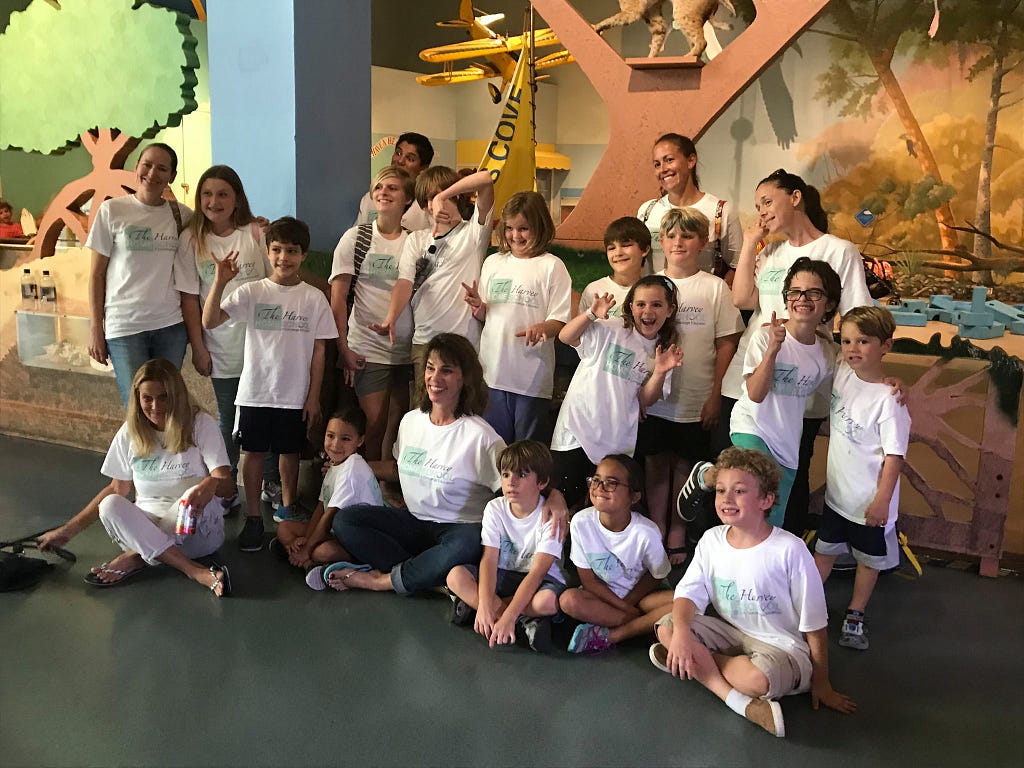Nancy Harvey of The Harvey Academy: 5 Things That Should Be Done To Improve The US Educational System

Reduced Screen Time — Limiting screen time is important because children need to engage all their senses in learning, not just sit passively in front of a screen. A more active, hands-on learning approach supports better physical and mental health.
As a part of our interview series about the things that should be done to improve the US educational system I had the pleasure to interview Nancy Harvey.
In the Spring of 2014, Nancy Harvey, M.Ed, made the difficult decision to resign from her position as a traditional 4th grade teacher. She was convinced that there had to be a better way to teach, especially for those students who learned differently. After much research the answer presented itself; The Harvey Homeschool. At this tutoring center she was able to create a concierge approach to teaching by devising individual education plans, thereby accommodating the different learning styles of each student. Word spread, praising her work and her classroom grew, and grew until she decided to establish The Harvey Academy in 2018. By becoming a school recognized by the state of Florida, Harvey Academy was now able to offer all state funded scholarships. As this private school continued to grow, Nancy and her staff took on the challenging task of pursuing accreditation with the Florida Council of Independent Schools, (FCIS). In the Fall of 2023, they succeeded in attaining this prestigious status. Nancy’s current pursuit is a partnership with Dr. Nora Wall and EduCalc Learning. This endeavor offers online courses designed for students with the diagnosis of dyscalculia or dyslexia. These courses will be offered nationwide to students who attend a school or homeschool situation that is unable to accommodate their neuro-diverse learning style. Nancy and Nora look forward to helping as many students as possible who need to be recognized for their atypical ability to learn and not just their diagnostic label.
Thank you so much for doing this with us! Our readers would love to “get to know you” a bit better. Can you share the “backstory”behind what brought you to this particular career path?
Ten years ago, I was in my 10th year of teaching at a traditional private school. During the last two years, I began to realize that despite my best efforts, I wasn’t reaching certain students. I offered free tutoring after school and gave them extra attention during reading and math classes, but many still struggled to earn Cs, and sometimes even Ds. They moved on to the next grade seeing school as a burden rather than something to enjoy.
In January 2014, I made the decision to leave that environment. I knew there had to be a better way to teach students who, no matter what I did, were still struggling. Eventually, I discovered that some had learning differences like dyslexia, dyscalculia, and ADHD, yet they were expected to simply push through and settle for mediocre grades. It broke my heart, and I knew I couldn’t be part of that system anymore.
Can you share the most interesting story that happened to you since you started your career? Can you tell us what lesson you learned from that?
One of the most surprising moments of this journey is actually how it all began. I had become quite friendly with one of my student’s moms, Ashley Flora, so I decided to tell her my decision to resign so she wouldn’t hear it from anyone else. While chaperoning a field trip I had the opportunity to speak to her privately. I mentioned that I didn’t have another job lined up yet, but I was determined to figure it out. To my surprise, she immediately asked, “Will you be my homeschool teacher?” I laughed and said, “Isn’t that an oxymoron?” But we decided to talk it through. As it turned out, her husband had been pressuring her to homeschool their kids, and she kept saying, “Only if Nancy Harvey teaches.”, thinking I would never leave my current employment. So when I surprised her with my announcement, we both felt it was pure kismet; we became each other’s answer to our individual struggles. That conversation happened in March, and by June, we had established a micro-school inside their home, — and the rest is history.
Are you working on any exciting new projects now? How do you think that will help people?
I’m currently working on an exciting new partnership with Dr. Nora Wall, where The Harvey Academy will offer EduCalc Learning online courses specifically designed for students diagnosed with dyscalculia. This partnership is a tremendous opportunity to further my mission of helping as many students as possible.
By moving online, I’m no longer limited by the constraints of a “brick and mortar” school. Initially, we’ll launch in Florida, but the plan is to eventually expand nationwide. This approach allows us to reach thousands of students who don’t have access to the specialized support they need to excel in math and science. It’s a way to provide the expertise these students deserve, no matter their location.
Can you briefly share with our readers why you are an authority in the education field?
I have 28 years of teaching experience, a master’s degree, and Florida certification, but what truly honed my skills and led me to become an unexpected entrepreneur and school owner was my time in the homeschool environment and tutoring center. During the first 3 years, I taught up to 8 students ranging in age and ability from pre-K through 6th grade. I had to effectively plan, execute lessons, and assess each student individually while managing a very diverse student body. This experience helped me master classroom management, especially with varied learning needs, which ultimately led to the fundamental concierge approach to teaching at Harvey Academy.
Ok, thank you for that. Let’s now jump to the main focus of our interview. From your point of view, how would you rate the results of the US education system?
The effectiveness of the US education system really depends on the population you’re measuring. For neurotypical students, like myself, I believe the public and traditional private sectors perform well. Students in this group have access to opportunities, and it’s often up to them to make the most of their education.
However, for the 20% of neurodiverse learners, such as those with dyslexia or dyscalculia, the system is failing. Some school districts won’t even allow the term “dyslexia” to be used in official documents because they don’t have an effective plan of action for these students. While there have been strides, especially since the pandemic, there’s still a long way to go. The pandemic has acted as a catalyst, pushing educators and administrators to recognize the needs of this underserved population, and parents to realize there are alternative opportunities for the education of their children. These learners are gaining more visibility, particularly through social media, but significant changes are still needed.
Can you identify 5 areas of the US education system that are going really great?
Here are five areas where I believe the US education system is doing really well:
- Dual Enrollment Opportunities — This is a fantastic option available to students across the board, allowing them to earn college credits while still in high school.
- Class Size Limits — There are efforts to limit class sizes to 18 students in lower grades and 25 in upper grades, which helps improve the quality of education, though I believe even smaller sizes would be ideal.
- Identifying Neurodiverse Students — While the system is far from perfect, there are promising efforts to identify and support neurodiverse students, which is an important step in the right direction.
- Enforcing Dress Codes — This helps address potential distractions and create a more focused learning environment.
- Schools Offering Art, Recess, and Project-Based Learning — Schools that continue to provide these opportunities are doing a great service to students by offering creative outlets, brain breaks, and hands-on learning experiences that foster a well-rounded learning environment.

Can you identify the 5 key areas of the US education system that should be prioritized for improvement? Can you explain why those are so critical?
Here are five key areas of the US education system that should be prioritized for improvement:
- Early Identification of Diverse Learners — Students with learning differences like dyslexia or dyscalculia need to be identified no later than 2nd grade. Early identification is critical to providing the specialized support they need, helping to preserve their self-esteem and build a strong foundation for learning.
- Smaller Class Sizes — Reducing class sizes to a maximum of 12 in lower grades and 16 in upper grades would allow teachers to give more individualized attention and prevent them from being overwhelmed, ultimately improving the quality of education.
- Daily Recess — Ensuring that all schools provide recess every day is essential. Playing outside and brain breaks are critical for a child’s cognitive development, well-being, and overall happiness.
- Increased Teacher Salaries — Teachers play a vital role in shaping the future, yet they are often underpaid and undervalued. Increasing their salaries would not only reflect their importance but also attract and retain quality educators.
- Reduced Screen Time — Limiting screen time is important because children need to engage all their senses in learning, not just sit passively in front of a screen. A more active, hands-on learning approach supports better physical and mental health.
How is the US doing with regard to engaging young people in STEM? Can you suggest three ways we can increase this engagement?
I believe there are plenty of opportunities for students to engage in STEM (Science, Technology, Engineering, and Math) in the current education system. I’d say the focus should be on ensuring that they are accessible to all students and that the quality of STEM education remains high. It’s important to continue fostering interest and making sure students from diverse backgrounds feel encouraged to pursue these fields.
Can you articulate to our readers why it’s so important to engage girls and women in STEM subjects?
Years ago, I took my homeschool students, many of whom were elementary school girls, to the Fort Lauderdale Museum of Science and Discovery to watch an IMAX film about female scientists. To my surprise, not one girl expressed interest in the careers portrayed in the movie; they all still wanted to be ballet dancers when they grew up.
Engaging girls and women in STEM is crucial in promoting the concept of a growth mindset. The belief that “anything is possible if you put your mind to it” is essential in education. As teachers, we have a responsibility to encourage all students, particularly girls, to believe in themselves and recognize their potential in these fields. By fostering their interest in STEM, we can help them understand that they can pursue diverse careers and make meaningful contributions to society.
How is the US doing with regard to engaging girls and women in STEM subjects? Can you suggest three ways we can increase this engagement?
To increase engagement, we can take a more integrated approach by combining STEM with girls’ current interests. Clever and relatable delivery is often the best way to introduce new topics and ideas, making STEM more accessible and appealing to girls and women.
Here are three specific suggestions to enhance engagement:
- Integrate STEM with Arts and Humanities: Create programs or projects that combine STEM topics with interests like theater, art, or literature.
- Role Models and Mentorship: Provide access to female role models in STEM fields who can share their experiences and inspire young girls.
- Hands-On Workshops: Organize interactive workshops that allow girls to explore STEM concepts in a fun, engaging way, such as coding camps or science fairs focused on their interests.
Can you please give us your favorite “Life Lesson Quote”? Can you share how that was relevant to you in your life?
My favorite quote is by Ralph Waldo Emerson, and it hangs on the wall of my office because it encapsulates my definition of success:
“To laugh often and much; to win the respect of intelligent people and the affection of children; to learn the appreciation of honest critics and endure the betrayal of false friends; to appreciate beauty; to find the best in others; to leave the world a little bit better, whether by a healthy child, a garden patch, or a redeemed social condition; to know that even one life has breathed easier because you have lived. This is to have succeeded.”
I first encountered this quote as a freshman in high school while studying American novelists and poets, including Emerson and Thoreau. It resonated with me deeply; I felt that it defined my aspirations, even if I didn’t know exactly how I would achieve them.
Years later, I found the quote on a magnet and decided to display it on my fridge, and eventually, I hung it in my office. It serves as a constant reminder of my life’s goals and values. It emphasizes the importance of making a positive impact on others and appreciating the beauty in life, which is something I strive for in both my personal and professional endeavors.
We are blessed that some of the biggest names in Business, VC funding, Sports, and Entertainment read this column. Is there a person in the world, or in the US, with whom you would love to have a private breakfast or lunch, and why? He or she might just see this if we tag them 🙂
If I could have a private breakfast or lunch with anyone, it would be Henry Winkler. He is dyslexic and has written over 40 children’s books featuring Hank, a young boy who wrestles with dyslexia. I would love the opportunity to thank him personally for his work, which has helped countless children understand that they aren’t “stupid” or alone in their struggles.
Henry Winkler faced significant challenges with dyslexia during his youth, and for a long time, people mistakenly thought he was lacking in intelligence. Despite having a difficult relationship with his parents, he turned his life around and used his experiences to inspire others. His books have played a crucial role in changing perceptions about dyslexia, showing children that they can succeed and that their learning differences do not define them. I would be honored to express my gratitude for everything he has done to support and uplift young readers. Bravo, Mr. Winkler!
How can our readers further follow your work online?
Facebook: https://www.facebook.com/TheHarveyAcademy
Website: https://www.theharveyacademy.com/
Instagram: https://www.instagram.com/the_harvey_academy/
Thank you so much for these insights! This was so inspiring!
Nancy Harvey of The Harvey Academy: 5 Things That Should Be Done To Improve The US Educational… was originally published in Authority Magazine on Medium, where people are continuing the conversation by highlighting and responding to this story.
